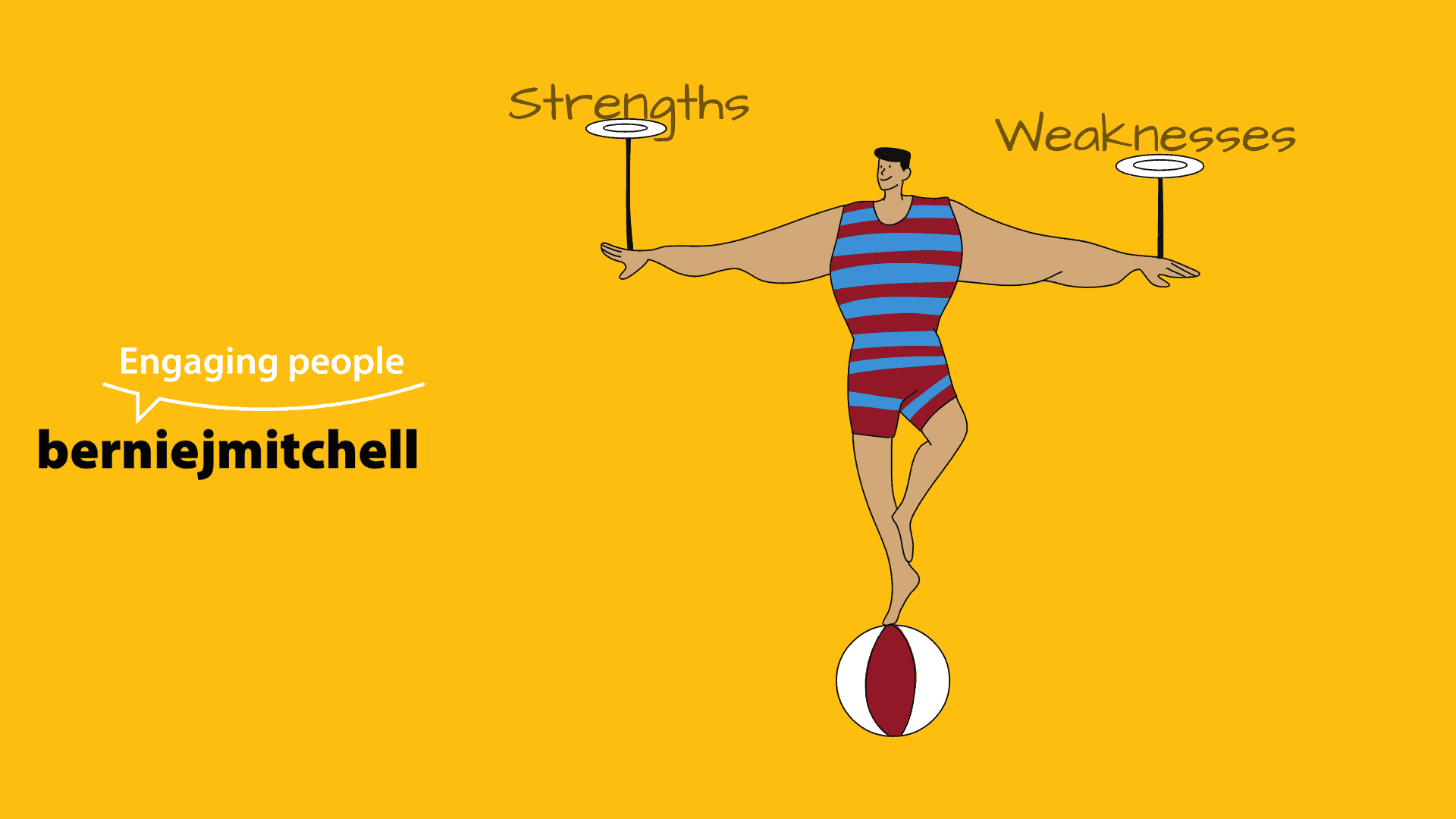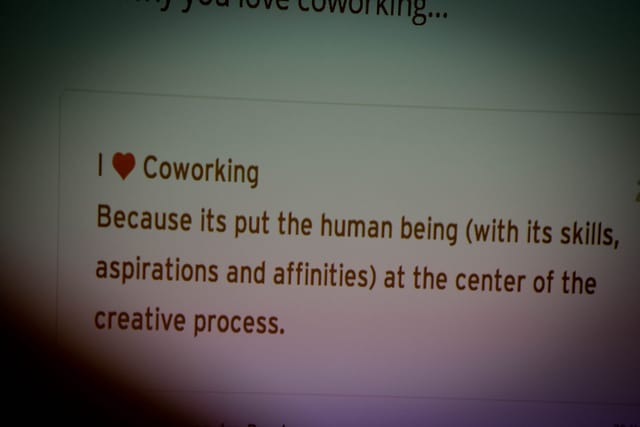TLDR – I got a good result from doubling down on a weakness.
Before you get into this post, I’m offering a very personal reflection of weaknesses and strengths.
So if you are looking for scientific confirmation, this is not the post for you.
My miserable, little life is a constant work in progress with highs and lows.
I am yet to make enough money to set fire to Lamborghini’s ‘live’ on Instagram for a laugh, so don’t expect a watertight success formula here.
So should we improve our weaknesses or focus on strengths?
In this post’s context, I would say it depends on your end goal or life plan.
If you are in a place where being the best in the world at something will serve you, follow what Jim Collins calls the hedgehog concept.
The Hedgehog Concept comes from the Jim Collins book Good to Great.
A simple, crystalline concept that flows from deep understanding about the intersection of three circles:
1) What you are deeply passionate about?
2) What you can be the best in the world at?
3) What best drives your economic or resource engine?
How I started to think about my weakness.
Way back in 2016, when Slack, Zoom and Elementor for WordPress were still shiny new things, I participated in a mind map workshop by my friend Caroline.
It was in the ‘Coworking Camp’ part of the Coworking Europe Conference that year.
In the simple class, Caroline asked us to map out where we’d like to be in one, three, five and ten years.
Of course, this timeline had occurred to me before but doing it with a group of people and doing it on a mind map blew my head off.
Painfully it brought into focus how many things I was spending time on that had nothing to with where I wanted to go with my family, my career and life.
It was not that bad; I was in the right place for many things.
But as Jim Collins says, I did not have the right people on my bus, and no one was in the right seats.
Building a life plan
After the Coworking Conference, I dived into Fizzle, an excellent place for freelancers and ‘independent economic agents’ to find to sort their act out.
Fizzle worked for me at the time because there was a clear road map to show you through the hours of courses in there.
In summer 2017, sitting in my mates garden in Poland hammering away at my keyboard, I decided to make a ten-year life commitment to sorting my shit out.
I can’t recall whether it was my idea or something in a course in Fizzle.
Before you get too impressed, I only know this because I set reminders and appointments in my google calendar for those ten years.
I’ve never found the plan again, but it is basically to travel and live in Spain, Poland, Argentina and the UK and work online.
That work will be creating content, podcasts, blogs and be in building community and building things.
Painfully vague, I know.
Get Specific
One of the best things I got out of Fizzle in 2017 was the decision matrix exercise which was part of the road map.
Outlined here in this video
I listed everything I know or think I know about and then scored each thing out of ten to how it works for me.
A new and fast-growing topic:
Something you’re already an expert at:
Something you love, almost in an unhealthy way (you eat, sleep and breath this):
A topic that you know important/influential people within:
There was a lot in there; the three topics that came out the other end were:
- Podcasting
- Coworking
- Productivity
So I had to find a way to make all these things work together, which, to be honest, took a while find.
So that was August 2017, and as we head for August 2021, it is way nearer than I thought it would be.
We’re not about to head into an ‘if you can dream it, you can do it’ post.
Here is the turning point
In January 2019, I read David Goggins book ‘Can’t hurt me’, which is the best book I have in the hundreds of books in my Audible library,
It helped me stop the endless self-doubt and inner complaining that had rattled around my head for my entire life.
But it confused me when Goggins told us we should double down on our weaknesses.
He has a riff about ‘true growth is at scratch’, and if we only do the same thing all the time we sacrifice our growth, we get comfortable.
He recommends we look at things and say I’m not good at it, but I’m going to be great.
What I’m crap at
I am crap at many things, so I was not about to double down on learning Japanese.
Nor was I about to double down being a midwife.
I was crap at hitting publish and writing.
So crap, every post and podcast and email I publish were like giving birth, so maybe that midwife weakness is not a weakness after all.
What stopped me? Things like imposter syndrome, lack of planning, lack of direction and unbelievable fear.
I had to beat this.
Part of me thought I was great at content, which was a fantasy.
I did not view my ‘content ability’ as a weakness; this is something I could do better than most people.
But following the ’12 Week Year’ and ’90 Day Challege’ showed me how much of a fantasy my publishing career was.
I doubled down.
I grew up and went to war with myself on how to make hitting publish happen.
What part of the process goes wrong for me?
Where do I waste time?
A big issue was getting my work out of Google docs and onto a website.
Checking the post with Grammarly and Natural Reader takes me ages.
I’m wonderfully Dyslexic, so I often miss letters or words, even after checking hundreds of times.
When formatting posts, working in Canva and other SEO elements, I’d go down a rabbit hole for hours, days, even weeks.
Get some help
Venice and Zara came on board to help with our websites and hitting publish.
I hired my mate Debbie to write posts that I know we need, but I don’t have the aptitude for writing.
Like this one on coworking space software.
Jax, a fellow marketing freelancer and I accidentally formed a rock-solid working relationship, and delivery shot up.
(Mainly her doing!)
One killer move was that we started to record interviews with people, run them through the otter app and edit them into blog posts.
I committed to only a few frameworks.
Everything I work on comes from these three books or frameworks.
I go into detail in this post here.
- 12 Week Year
- They Ask You Answer
- Marketing Made Simple
Of course, these books connect to other practices, frameworks, communities, classes and software.
But I always come back to these three when I’m confused or overwhelmed, which happens daily.
How is my weakness working out?
In January 2019, I read the David Goggins book and started the fight with myself.
After a struggle, wandering around in the dark, and bumping into more than a few hard things, great results started happening.
2020 was where real growth happened.
In the face of the most challenging time for our industry and the world, my crew consistently produced more content than ever.
Most of our workflow across all our projects got organised at the end of 2019.
In 2020, we published more podcasts, blogs, and email newsletters than ever.
I mean, like hundreds and hundreds, my face fell off.
So many words got written and published that we felt like Marvel Comics.
Marketing is a commitment, not a campaign.
My mate Jon Buscall has been saying this for years; this is how I understand the ‘hit publish’ quest.
It started with sorting out my ‘hit publish’ issue and has led to a never-ending job of fine-tuning and constant improvement.
There is still so much to do, to fix, to learn.
Right now, I’m focusing on copywriting, email marketing and headline writing.
After this journey, I’d tell you to pick a weakness within where you want to be strong; what are you avoiding?
What part of your puzzle does not work?
Look at that with radical self-honesty, and get some help!

